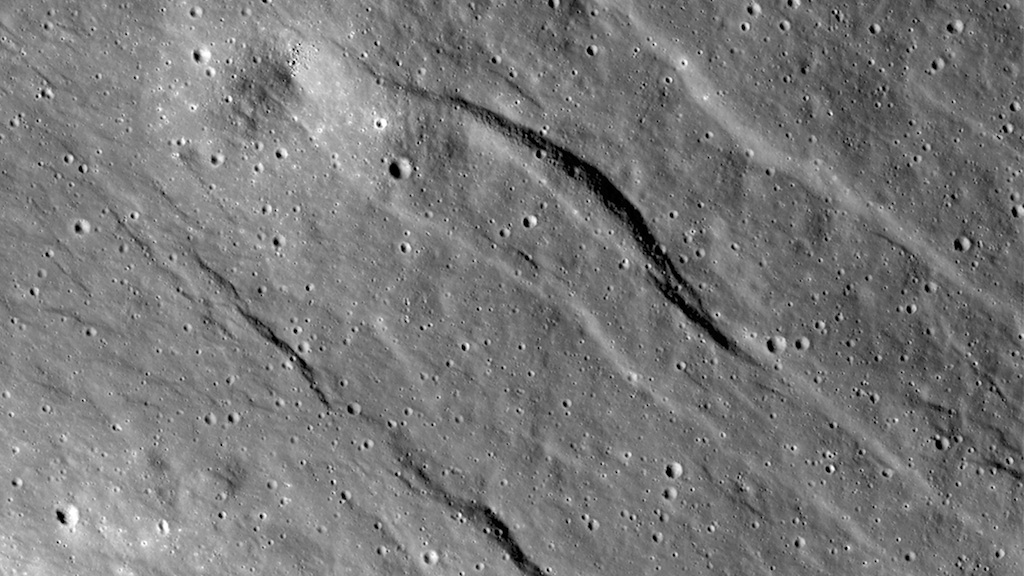NASA Spacecraft Reveals Recent Geological Activity on the Moon
New images acquired by NASA's Lunar Reconnaissance Orbiter (LRO) spacecraft show that the moon's crust is being slightly stretched, forming small valleys - at least in some small areas. High-resolution images obtained by the Lunar Reconnaissance Orbiter Camera (LROC) provide evidence that these valleys are very young, suggesting the moon has experienced relatively recent geologic activity.
Smithsonian Instituion Senior Scientist Tom Watters explains more about the moon's recent geological activity in this short video.
The largest of the newly detected graben found in highlands of the lunar farside. The broadest graben is about 500 m wide and topography derived from Lunar Reconnaissance Orbiter Camera (LROC) Narrow Angle Camera (NAC) stereo images indicates they are almost 20 m deep.
Credit: NASA/GSFC/Arizona State University/Smithsonian Institution
A series of graben in a patch of mare basalts that occupy a valley south of Mare Humorum cut across and deformed several small diameter impact craters. The walls and floors of the graben crosscut a degraded 27 m diameter crater (inset, upper white arrow) and a 7 m diameter crater (inset, lower white arrow). Since small craters only have a limited lifetime before they are destroyed by other impacts, their deformation by graben indicates that these fault-bound troughs are relatively young.
Credit: NASA/GSFC/Arizona State University/Smithsonian Institution
Newly detected series of narrow linear troughs are known as graben, and they fomed in highland materials on lunar farside. Forces acting to pull the lunar crust apart formed the Virtanen graben, informally named for a nearby impact crater. These graben are located on a topographic rise with several hundred meters of relief revealed in topography derived from Lunar Reconnaissance Orbiter Camera (LROC) Narrow Angle Camera (NAC) stereo images (blues are lower elevations and reds are higher elevations). The rise is flanked by the rim of a ~2.5 km diameter degraded crater.
Credit: NASA/GSFC/Arizona State University/Smithsonian Institution
Interview with Thomas Watters, Senior Scientist, Smithsonian Institution, National Air and Space Museum.
Credits
Please give credit for this item to:
NASA/Goddard Space Flight Center
-
Video editor
- Dan Gallagher (USRA)
-
Interviewee
- Tom Watters (Smithsonian/Air and Space)
-
Producer
- Dan Gallagher (USRA)
-
Scientists
- Tom Watters (Smithsonian/Air and Space)
- Richard Vondrak (NASA/GSFC)
-
Videographer
- Rob Andreoli (Advocates in Manpower Management, Inc.)
-
Writer
- William Steigerwald (NASA/GSFC)
Release date
This page was originally published on Monday, February 20, 2012.
This page was last updated on Wednesday, May 3, 2023 at 1:53 PM EDT.
Missions
This page is related to the following missions:Series
This page can be found in the following series:Tapes
The media on this page originally appeared on the following tapes:-
NASA Spacecraft Reveals Recent Geological Activity on the Moon
(ID: 2012021)
Monday, February 20, 2012 at 5:00AM
Produced by - Brendan Antiochos (NASA)
